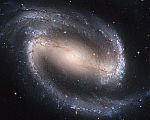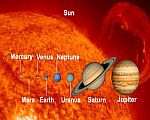The Conditions For Alien Life - what are they?
The conditions for alien life are very much taken into consideration by astronomers and astrobiologists when searching the heavens for exoplanets. Because we only have Earth as an example of a planet that can support intelligent life, the quest is very much based on seeking out other Earth-like planets, especially those that feature liquid water.
The Circumstellar Habitable Zone
This zone, abbreviated to CHZ (also known simply as the "habitable zone" or, more colloquially, the "Goldilocks zone" - because it's "just right") is simply the area around a star such that a planet orbiting within it would be able to support liquid water.
As well as the planet's distance from its star, various other criteria have to be taken into consideration. The planet must possess a sufficiently thick atmosphere in order to sustain the water once it was there (a thin one would allow the water to boil off into space). Going back even further, the solar system housing the planet must have a source of water to stock it in the first place. (It is still something of a mystery where Earth's oceans originally came from.) Lastly, the planet must possess a magnetosphere that deflects harmful solar radiation that may jeopardize the sustainability of the planet's atmosphere and water.
The Galactic Habitable Zone
Looking even further afield, the place of the planet's solar system in the galaxy is important, too. It has to be close enough to the centre for the stars to contain heavier elements (pretty much essential for life), but not too close as to be affected by the dangerous radiation and intense gravitational forces found there.
So, What's The Big Deal With Water?
You may be thinking by now, why should conditions for alien life rely so heavily on the presence of water. Well, to explain, we're going to have to consider the science of biochemistry.
All complex, multicellular organisms metabolise in order to live and this metabolism involves internal biochemical reactions. As this is the case for all forms of life on Earth, it seems reasonable to assume this rule also applies to alien life forms on other planets. These biochemical reactions need to take place within a liquid "solvent" and, here on Earth, that solvent is water.
Hang on, though. Just because it's water on our planet, why should it be the same on another planet somewhere else in the Galaxy? For this, we need to take into account the laws of probability. A chemical compound that would work as a solvent is likely to be formed from the most abundant elements in the Universe. The most abundant such element is hydrogen, followed by helium, oxygen, neon, nitrogen, carbon, silicon, magnesium, iron and sulphur, in ever decreasing amounts.
So, you see from this that the two elements required to make water, hydrogen and oxygen, are more abundant than all the others except helium (which is largely inert) and it makes sense to assume that a life form is likely to have a water-based biochemistry. Hence the search for liquid water on planets.
Any Alternatives?
Does this "solvent" have to be water, though? Let's go back to the list of elements. The next possible solvent is ammonia (NH3), followed by hydrogen sulphide (H2S). At the most extreme, it has been suggested that methane (CH4) could possibly be the basis of an extremely alien biochemistry
Okay, there may be life forms elsewhere in the Galaxy that have biochemistries based on these solvents, but, in terms of versatility, water trumps all of them. It still remains the most likely solvent for intelligent alien life.
What About Atmosphere?
What kind of atmosphere would be part of the conditions for alien life? Would extraterrestrials necessarily breathe oxygen, like us?
Surprisingly enough, the answer is thought to be "yes"! Again considering biochemistry, it is known from the study of Earth life forms that oxygen is the single best element, by far, to create vast amounts of energy during metabolism. This energy is pretty much essential for life forms to develop, resulting in intelligence, technology and civilization.
Observations have shown that some life forms that do not utilise oxygen never produce sufficient energy levels to develop complexity, so it looks quite likely that an alien life form will actually breathe the same air as us.
Alternative Conditions For Alien Life
The alternative solvents mentioned above - ammonia, hydrogen sulphide and methane, while theoretically providing conditions for alien life, would necessarily require different planetary conditions to work. It would need to be much colder, for example, or there may be the need for a greater atmospheric pressure.
Primitive alien life may exist under such conditions, but whether it would have the potential to develop intelligence and a technology is a matter of conjecture.
return to extraterrestrail life









Facebook Comments
Have your say about what you just read! Leave me a comment in the box below.